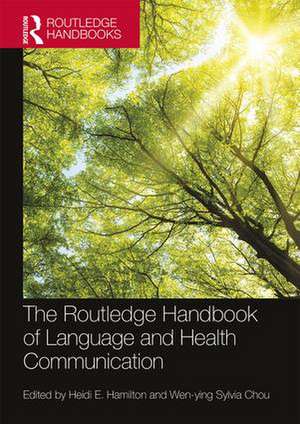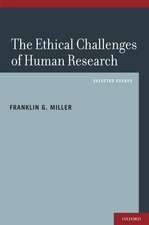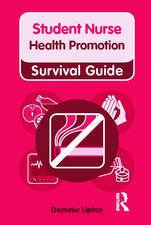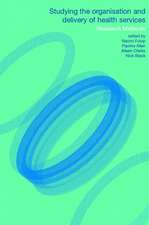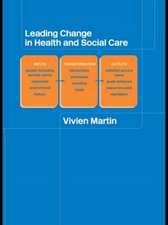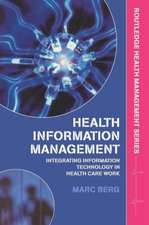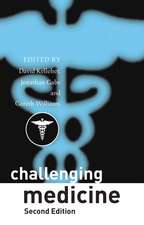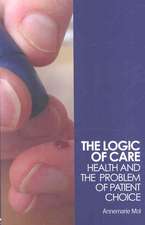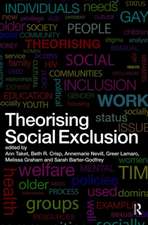The Routledge Handbook of Language and Health Communication: Routledge Handbooks in Applied Linguistics
Editat de Heidi Hamilton, Wen-ying Sylvia Chouen Limba Engleză Paperback – 18 oct 2016
The Handbook is divided into three sections:
- Individuals’ everyday health communication
- Health professionals’ communicative practices
- Patient-provider communication in interaction
Building on established work with cutting-edge studies on the changing health communication landscape, this volume will be an essential reference for all those involved in health communication and applied linguistics research and practice.
| Toate formatele și edițiile | Preț | Express |
|---|---|---|
| Paperback (1) | 489.67 lei 43-57 zile | |
| Taylor & Francis – 18 oct 2016 | 489.67 lei 43-57 zile | |
| Hardback (1) | 1627.70 lei 43-57 zile | |
| Taylor & Francis – 18 feb 2014 | 1627.70 lei 43-57 zile |
Din seria Routledge Handbooks in Applied Linguistics
-
 Preț: 353.43 lei
Preț: 353.43 lei -
 Preț: 382.57 lei
Preț: 382.57 lei -
 Preț: 371.84 lei
Preț: 371.84 lei -
 Preț: 347.56 lei
Preț: 347.56 lei - 9%
 Preț: 1525.64 lei
Preț: 1525.64 lei -
 Preț: 371.25 lei
Preț: 371.25 lei -
 Preț: 347.27 lei
Preț: 347.27 lei -
 Preț: 371.34 lei
Preț: 371.34 lei -
 Preț: 347.80 lei
Preț: 347.80 lei -
 Preț: 347.16 lei
Preț: 347.16 lei -
 Preț: 372.90 lei
Preț: 372.90 lei -
 Preț: 348.29 lei
Preț: 348.29 lei - 9%
 Preț: 1525.45 lei
Preț: 1525.45 lei - 9%
 Preț: 1488.22 lei
Preț: 1488.22 lei -
 Preț: 361.63 lei
Preț: 361.63 lei -
 Preț: 346.64 lei
Preț: 346.64 lei - 8%
 Preț: 397.17 lei
Preț: 397.17 lei -
 Preț: 465.24 lei
Preț: 465.24 lei - 18%
 Preț: 1568.16 lei
Preț: 1568.16 lei - 21%
 Preț: 380.81 lei
Preț: 380.81 lei - 25%
 Preț: 1222.63 lei
Preț: 1222.63 lei -
 Preț: 448.11 lei
Preț: 448.11 lei - 30%
 Preț: 1223.84 lei
Preț: 1223.84 lei -
 Preț: 438.21 lei
Preț: 438.21 lei - 25%
 Preț: 1248.80 lei
Preț: 1248.80 lei - 18%
 Preț: 1627.70 lei
Preț: 1627.70 lei -
 Preț: 478.20 lei
Preț: 478.20 lei - 26%
 Preț: 1216.82 lei
Preț: 1216.82 lei - 18%
 Preț: 1634.97 lei
Preț: 1634.97 lei - 18%
 Preț: 1337.40 lei
Preț: 1337.40 lei -
 Preț: 372.27 lei
Preț: 372.27 lei - 15%
 Preț: 482.93 lei
Preț: 482.93 lei -
 Preț: 347.75 lei
Preț: 347.75 lei - 18%
 Preț: 1620.60 lei
Preț: 1620.60 lei - 18%
 Preț: 1620.92 lei
Preț: 1620.92 lei - 18%
 Preț: 1635.73 lei
Preț: 1635.73 lei - 18%
 Preț: 1616.67 lei
Preț: 1616.67 lei - 26%
 Preț: 1218.12 lei
Preț: 1218.12 lei
Preț: 489.67 lei
Preț vechi: 576.08 lei
-15% Nou
Puncte Express: 735
Preț estimativ în valută:
93.73€ • 101.84$ • 78.78£
93.73€ • 101.84$ • 78.78£
Carte tipărită la comandă
Livrare economică 21 aprilie-05 mai
Preluare comenzi: 021 569.72.76
Specificații
ISBN-13: 9781138284487
ISBN-10: 1138284483
Pagini: 700
Dimensiuni: 174 x 246 x 48 mm
Greutate: 1.25 kg
Ediția:1
Editura: Taylor & Francis
Colecția Routledge
Seria Routledge Handbooks in Applied Linguistics
Locul publicării:Oxford, United Kingdom
ISBN-10: 1138284483
Pagini: 700
Dimensiuni: 174 x 246 x 48 mm
Greutate: 1.25 kg
Ediția:1
Editura: Taylor & Francis
Colecția Routledge
Seria Routledge Handbooks in Applied Linguistics
Locul publicării:Oxford, United Kingdom
Public țintă
PostgraduateRecenzii
'I commend this book unreservedly as it draws our attention to the crucial role of language in the delivery of safe and effective healthcare and places communication as critical to patient-centred care. It represents a state of the art collection of articles on language and communication from a range of different disciplines and theoretical perspectives. It is of immense value for any student and scholar interested in healthcare, healthcare communication or applied linguistics.'
Diana Slade, Director of the International Research Centre for Communication in Healthcare (IRCCH)
Hong Kong Polytechnic University and University of Technology, Sydney, Australia
Diana Slade, Director of the International Research Centre for Communication in Healthcare (IRCCH)
Hong Kong Polytechnic University and University of Technology, Sydney, Australia
Cuprins
Introduction, Heidi E.Hamilton, Wen-ying SylviaChou; Part 1 Individuals’ everyday health communication; Chapter 1 Health communication ‘noise’, Nancy J.Burke, Judith C.Barker; Chapter 2 Speaking your health, Mark R.Luborsky; Chapter 3 Perceived risk and health risk communication, Erika A.Waters, AmyMcQueen, Linda D.Cameron; Chapter 4 If numbers could speak, ChristinaZarcadoolas, WendyVaughon; Chapter 5 Corpus linguistics and evidence-based health communication, Paul Crawford, BrianBrown, KevinHarvey; Chapter 6 A linguistic analysis of diabetes patients’ talk, UllaConnor, KathrynLauten; Chapter 7 Health risks and mediated discourse, Rodney H.Jones; Chapter 8 Contesting chemotherapy, amputation, and prosthesis, VaidehiRamanathan; Chapter 9 Alzheimer’s diagnosis on trial, Peter A.Lichtenberg, Mark R.Luborsky; Chapter 10 Applied linguistics as a resource for understanding and advancing health literacy, DonaldRubin; Chapter 11 Health disparities research and practice, Sherrie FlyntWallington; Chapter 12 Web 2.0 and the changing health communication environment, AbbyPrestin, Wen-ying SylviaChou; Chapter 13 Interaction in online support groups, WykeStommel, JoyceLamerichs; Chapter 14 Quality and usefulness of written communication for patients, RosemaryClerehan; Chapter 15 Persuasion vs. information in direct-to-consumer advertising of prescription drugs, Peter J.Schulz, UweHartung; Part 2 Health professionals’ communicative practices; Chapter 16 Why read and write in the clinic?, RitaCharon; Chapter 17 Presencing in the context of enhancing patient well-being in nursing care, SallyCandlin, Christopher N.Candlin; Chapter 18 Transforming medical school culture, Richard M.Frankel, ElainaChen; Chapter 19 Communication skills training for resident physicians, BenjaminBlatt, Noemi AliceSpinazzi, LarrieGreenberg; Chapter 20 Teaching medical students to become discourse analysts, Mei-huiTsai, Feng-hwaLu, Richard M.Frankel; Chapter 21 Exploring communicative interactions between visitors and assisted-living residents with dementia, BoydDavis, MargaretMaclagan, DenaShenk; Chapter 22 Healthcare team communication, Melinda M.Villagran, Paula K.Baldwin; Chapter 23 The interpenetration of communicative contexts, Aaron V.Cicourel; Chapter 24 Mental healthcare professionals’ role performance, Branca TellesRibeiro, Diana de SouzaPinto, Claudio GruberMann; Chapter 25 Clinical incident reporting, incident investigation, and incident disclosure, RickIedema; Part 3 Patient–provider communication in interaction; Chapter 26 Before the ‘official diagnosis’, ThomasSpranz-Fogasy; Chapter 27 After the diagnosis, Karen S.Schaepe, Douglas W.Maynard; Chapter 28 Managing hopeful moments, Wayne A.Beach; Chapter 29 Medication and morality, FeliciaRoberts, Jennifer S.Kramer; Chapter 30 The role of the electronic patient record in the clinical consultation, DeborahSwinglehurst, CeliaRoberts; Chapter 31 Provider–patient communication about complementary and alternative medicine, Evelyn Y.Ho, Christopher J.Koenig; Chapter 32 Negotiation of health, illness, and treatment in Korean Oriental medical discourse, Ki-taeKim; Chapter 33 Midwives’ communicative expertise in obstetric ultrasound encounters, SrikantSarangi, HeidiGilstad; Chapter 34 Genetic counseling in multicultural and multilingual contexts, OlgaZayts, AlisonPilnick; Chapter 35 Interpreting in the healthcare setting, Claudia V.Angelelli; Chapter 36 The contribution of provider–patient communication to health disparities, Carma L.Bylund, Emily B.Peterson; Chapter 37 Analyzing ethics-in-interaction in medical decision-making, EllenBarton, AndrewWinckles; Chapter 38 Physician–patient communication about cancer clinical trials, Richard F.Brown; Chapter 39 Medical interaction analysis systems, LeeEllington, McKenzieCarlisle, MaijaReblin; Chapter 40 Donation solicitation in interaction, Elizabeth M.Bishop;
Notă biografică
Heidi E. Hamilton is Professor and Chair in the Department of Linguistics, Georgetown University, USA.
Wen-ying Sylvia Chou is a Program Director in the Health Communication and Informatics Research Branch at the National Cancer Institute, USA.
Wen-ying Sylvia Chou is a Program Director in the Health Communication and Informatics Research Branch at the National Cancer Institute, USA.
Descriere
The Routledge Handbook of Language and Health Communication's 40 chapters are organized within three sections to provide a broad and comprehensive overview of the role that linguistics plays within health communication research and its applications.
